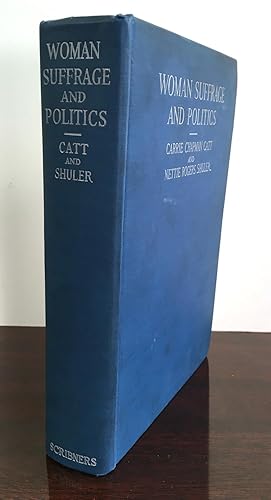Descripción
Book. Woman Suffrage and Politics: The Inner Story of the Suffrage Movement. New York: Charles Scribner's Sons, 1923. No. 122 of 1,000 "Co-workers edition," copy belonging to Chicago suffragist, millionaire and vice chairman of the Republican Party, Bertha Baur. 504 pp., 5 3/4 x 8 1/4 in. With: ROSE YOUNG. Typed Letter Signed, March 15, 1923, to Bertha Baur, New York, NY. On colorful illustrated "The Woman Citizen" letterhead. 1 p., 8 3/8 x 10 3/4 in. #25601.01 "The gates to political enfranchisement have swung open. The women are inside." Excerpts from the letter:"I know it will mean more to you than even to most suffragists to learn that Mrs. Catt has set down her private interpretation of that struggle in a book, 'Woman Suffrage and Politics, the Inner Story of the Suffrage Movement', and I feel certain that you will be glad of an invitation to enroll on the list of subscribers to the Co-Workers Edition of the book. Mrs. Catt is absent from America - off on one of her laborious tours for suffrage in other lands."Excerpts from the book:"The gates to political enfranchisement have swung open. The women are inside. In the struggle up to the gates, in unlocking and opening the gates, women had some strange adventures. They learned some strange things. Especially startling became their experiences and their information when woman suffrage once crossed the devious trail of American politics. It is with that point of intersection that this book concerns itself." (vii)"America's history, her principles, her traditions stood forth to indicate the inevitability of woman suffrage, to suggest that she would normally be the first country in the world to give the vote to women. Yet the years went by, decade followed decade, and twenty-six other countries gave the vote to their women while America delayed. Why the delay?" (viii)"We think that we have the answer. It was, not an antagonistic public sentiment, nor yet an uneducated or indifferent public sentiment-it was the control of public sentiment, the deflecting and the thwarting of public sentiment, through the trading and the trickery, the buying and the selling of American politics." (viii)"There had been hours for the Indian, the Russian, the German, the Chinese, the foreigner, the saloon, hours when each had decided the limits of woman's sphere, but no woman's hour had come." (127)"Those invisible influences that were controlling elections; that invisible and invincible power that for forty years kept suffragists waiting.was, manifestly, the power that inhered in the combined liquor interests." (132)"nothing in connection with the suffrage struggle was ever allowed to be easy." (364)Full text of Woman Suffrage and Politics: The Inner Story of the Suffrage Movement (1926 ed.)When Young wrote this letter, Catt was in Europe promoting the cause of woman suffrage. A few weeks after the date of this letter, Catt was introduced to Italian dictator Benito Mussolini, whom she confronted about the issue. More than one thousand delegates met at the International Women's Congress in Rome in May 1923. Mussolini attended the opening meeting and declared that his government would grant the vote to several classes of women.Rose Emmet Young (1869-1941) was born in Montana and operated a lumber company, while contributing fiction to magazines and newspapers under a pen name. In 1899, she moved to New York, where she joined the staff of the New York Evening Post. In 1915, Carrie Chapman Catt hired Young to direct the Leslie Bureau of Suffrage Education. Young compiled and redistributed news, editorials, photographs, cartoons, and statistics about women's suffrage to newspapers and wire services throughout the United States. In 1917, Young began editing The Woman Citizen, a weekly journal for women, created from the merger of The Woman's Journal, National Suffrage News, and The Woman Voter.Carrie Clinton Lane Chapman Catt (1859-1947) played a key role in the. (See website for full description). N° de ref. del artículo 25601
Contactar al vendedor
Denunciar este artículo
![]()
